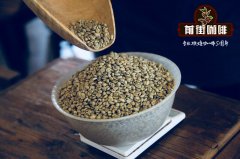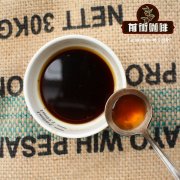China imported Coffee Bean Trading website Coffee Bean Import Packaging and Inspection process Customs Declaration

Professional coffee knowledge exchange more coffee bean information please follow the coffee workshop (Wechat official account cafe_style)
Every cup of black and mellow coffee comes from coffee bean grinding and extraction. the quality of the coffee bean itself affects the flavor of the entrance. Ninety-five per cent of Taiwan's coffee beans come from overseas. According to the 2014 Food Border Inspection Annual report Handbook of the Food and Drug Administration of the Ministry of Health and Fuzhou, Taiwan imported 32000 metric tons of coffee beans from abroad, more than tripling compared with 2006. However, official statistics are slow to update. Wu Yiling, director of the Taiwan Coffee Association, pointed out that the annual growth rate of coffee bean imports is almost more than 30%. According to a rough estimate, Taiwan's coffee bean imports have grown at least 2.7 times over the past decade.
Taiwan imports coffee beans from as many as 73 countries, and the top five countries applying for inspection are Japan, the United States, Vietnam, Indonesia and Malaysia. Due to the diversity of sources, in order to do a good job in basic food safety checks, pesticide residues and ochratoxin are sampling items for coffee beans when the FDA conducts border checks at the customs.
Ochratoxin A (Ochratoxin A) is a secondary metabolite secreted by Penicillium and Aspergillus. It has nephrotoxicity, immunosuppression, carcinogenicity and so on. Ochratoxin is ubiquitous in nature, in which soybeans, peanuts, corn, coffee beans and other agricultural products are easily contaminated by ochratoxin if they are not preserved properly in a high-temperature and humid environment. Ochratoxin accumulates in the human body, may cause kidney, liver and other diseases. Therefore, if there are people who often drink a lot of coffee, you should pay special attention to it.
However, from the coffee bean processing process, the coffee fruit after processing to the raw bean water content is only 12%, and the roasted ripe beans, the moisture content is less than 5%, stored in the dry state, not easy to mildew. However, if coffee beans are damp or improperly stored during shipping, there is still a risk of ochratoxin production. In the 1970s and 1980s, Wu Yi-ling saw a situation in which a large number of coffee beans spoiled due to dampness during the sea voyage and could still be sold through customs. However, such problems have ceased to be seen under the active guidance of coffee associations and operators.
Major coffee importers in China all have coffee storage space. Take Golden Coffee, where Wu Yiling works, as an example. The warehouse where a large number of raw beans are stored is at least three stories high in order to maintain good ventilation. In case of rainy seasons, there are special personnel responsible for maintaining storage humidity and maintaining the quality of coffee beans. In view of the increasing demand of consumers for the quality of coffee beans, Golden car Coffee is building coffee warehouses with refrigerated air-conditioning equipment to let coffee live in air-conditioned rooms to maintain the best quality and flavor.
As for the question of whether coffee beans have pesticide residues, Wu Yiling visited major coffee producing countries in the world and found that most of them are poor and backward countries, and the application of pesticides by farmers is not in line with economic benefits, and after the coffee fruit has been processed, the probability of pesticide residues is extremely low. According to the results of coffee sampling tests conducted by the Food and Drug Department over the years, the failure rate is very low.
However, some people in the coffee industry have revealed that the coffee border inspection is a "sampling", not batch-by-batch inspection, and it is still possible to drink defective beans with bad luck. Therefore, after buying raw beans, many operators will conduct manual screening before baking to ensure the quality of the beans. Some people may even think that the bulk commercial coffee beans that have not been manually screened are more likely to be mixed with defective beans and the quality is relatively poor.
Wu Yiling believes that the concept of "picking beans by hand is good coffee" does not apply to the general public. Generally speaking, coffee that needs to pick beans manually is usually tasted as fine coffee produced in small quantities, as well as coffee used for testing when participating in coffee competitions. In general, coffee beans are "graded" (grading) according to their origin, factory height, particle size and the number of imperfections in the sample (including broken beans, pebbles or branches, etc.).
And now the automatic screening of coffee beans has improved from the use of infrared identification to the color sorting machine. After the raw beans enter the guide trough, the color selection machine will blow out the defective beans that do not conform to the color setting from the bean stream, and the beans that have been selected by color will also be screened manually through the conveyor belt to pick out obvious defective beans. Therefore, when selecting beans, manufacturers only need to confirm whether the sample beans meet the classification, because the graded beans naturally have the corresponding quality, and there is no need to worry too much when baking and drinking them later.
Important Notice :
前街咖啡 FrontStreet Coffee has moved to new addredd:
FrontStreet Coffee Address: 315,Donghua East Road,GuangZhou
Tel:020 38364473
- Prev

How to handle the import of coffee beans? Is the import of coffee beans a profiteering industry? What is the tax on imported coffee?
Professional coffee knowledge exchange more coffee bean information please follow the coffee workshop (Wechat official account cafe_style) I do not know whether it is an open secret coffee beans (roasted) the retail price is about six or seven times the cost of imported raw beans, those so-called boutique beans can even be up to ten times because I visited a coffee factory next to Zhonghe a COSTCO last month.
- Next

Tax and customs declaration procedures for imported coffee what information is needed for the import of Chinese coffee beans?
Professional coffee knowledge exchange more coffee bean information please follow coffee workshop (Wechat official account cafe_style) transfer back from Hong Kong customs clearance does not need to provide formalities, can do package tax clearance of imported unroasted coffee beans tariff 8% value added tax 17% roasted coffee beans tariff 15% value added tax 17% first of all coffee bean imports need specific qualifications: 1. Import and export rights
Related
- Guji coffee producing area of Guji, Ethiopia: Humbela, Shakiso, Wulaga
- What is the most expensive variety of Qiloso in BOP multi-variety group?
- How to store the coffee beans bought home?
- Why are Yemeni coffee beans so rare now?
- Ethiopian Sidamo all Red Fruit Sun Sun Santa Vini Coffee beans
- SOE is mostly sour? What does it mean? Is it a single bean? what's the difference between it and Italian blending?
- Is Italian coffee beans suitable for making hand-brewed coffee?
- How to choose coffee beans when making cold coffee? What kind of coffee beans are suitable for making cold coffee?
- Just entered the pit to make coffee, what kind of coffee beans should be chosen?
- Can only Japan buy real Blue Mountain Coffee? What are authentic Jamaican Blue Mountain coffee beans?

